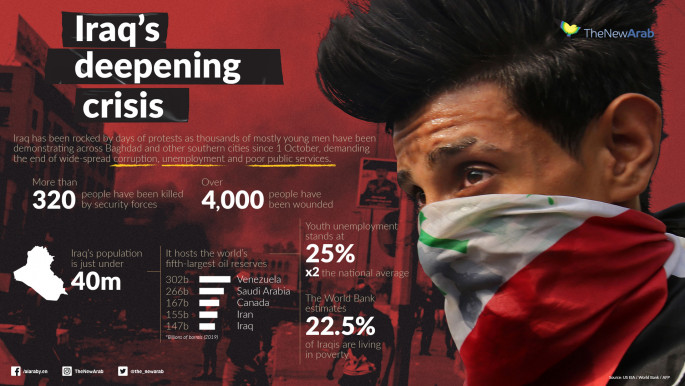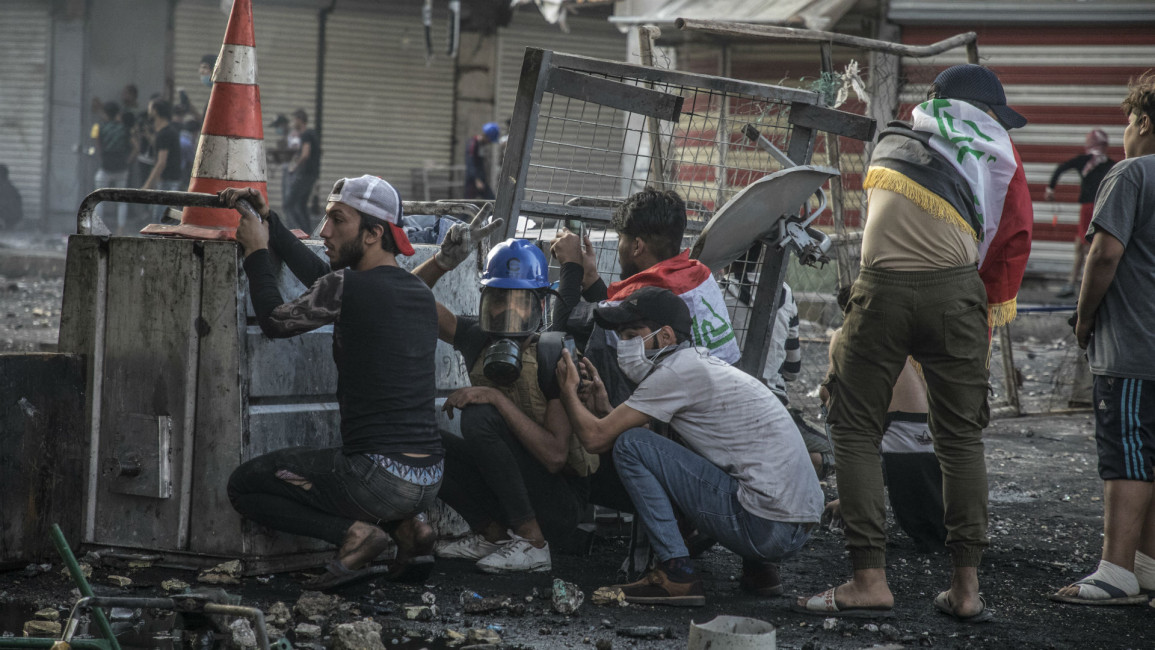Iraqi protesters spill back onto bridge in Baghdad following Friday's deadly blast
Dozens climbed up into a large parking complex near the bridge, unfurling a sign in support of demonstrators in nearby Tahrir.
The protest movement had spilled over onto four bridges crossing the river Tigris that link east Baghdad to the city's west where government buildings and foreign embassies are based.
Security forces retook three of those bridges and nearby districts more than two weeks ago, pinning the protesters back in Tahrir and on Al-Jumhuriyah bridge with volleys of tear gas, live ammunition and even machine-gun fire.
On Saturday morning, Iraqi units pulled back from some of those areas and crowds of protesters chased them down, resuming their sit-in at the mouth of Al-Sinek bridge.
"The security forces withdrew to another concrete barrier on Al-Sinek," one protester told AFP.
An elderly woman, who had travelled from the southern port city of Basra to join the rallies, cheered in support.
"You didn't just lose us, you lost all of Iraq!" she said, addressing Prime Minister Adel Abdel Mahdi.
"Get out, get out, there's no place for you here. Tonight, we'll be in the Green Zone," she said, referring to the area across the river housing Abdel Mahdi's office, parliament, the US embassy and other key buildings.
Protesters have occupied Baghdad's Tahrir (Liberation) Square for more than three weeks, demanding the overhaul of a ruling system they see as corrupt and unjust.
 |
On Friday night, at least one person was killed and more than a dozen wounded in Tahrir when explosives beneath a parked car detonated, Iraq's state security forces said.
The morning after Friday's blast, small clusters of men deployed around the square to search all those entering it.
"We had a security breach yesterday and this explosion happened," said Abu Karrar al-Basrawi, a middle-aged man from Basra volunteering for the search.
"But we've multiplied our checkpoints so it doesn't happen again," he told AFP.
Earlier on Friday, Iraq's top Shia cleric gave a major boost to the anti-government protests with his most emphatic endorsement to date.
Grand Ayatollah Ali Sistani cautiously backed the protests when they began but has since firmed up his support, describing protests on Friday as "the honourable way" to seek change.
"If those in power think that they can evade the benefits of real reform by stalling and procrastination, they are delusional," Sistani said in his weekly sermon, delivered by a representative in the Shia holy city of Karbala.
"What comes after these protests will not be the same as before, and they should be aware of that."
The 89-year-old cleric, who is based in the Shia holy city of Najaf and never appears in public, remains hugely influential in the Shia-majority south.
Shortly after his sermon, demonstrators hit the street in Najaf.
Thousands also rallied in the southern hotspots of Kut, Hilla, Nasiriyah and Diwaniyah, according to local reports.
And in the port city of Basra, protesters blocked cargo trucks from accessing Umm Qasr port, the main entry point for food and medical imports into Iraq.
Security forces had ended a sit-in there a week ago but a group of about 20 men cut the road again on Friday.
In Tahrir, crowds held their ground after hearing the Shia religious leadership, or "marjaiyah".
In neighbouring Khallani Square, two protesters were shot dead on Friday afternoon, according to a medical source, after one was killed the previous night.
A third protester was killed in the square later by a tear gas cannister, the same source said.
More than 330 people have died since the rallies erupted, making them the deadliest grassroots movement to hit Iraq in years.
They present the biggest threat so far to the political system ushered in by the US-led invasion which toppled the regime of longtime dictator Saddam Hussein in 2003.
Protesters blame that system for rampant corruption, staggering unemployment rates and poor services in resource-rich Iraq, OPEC's second-biggest producer.



